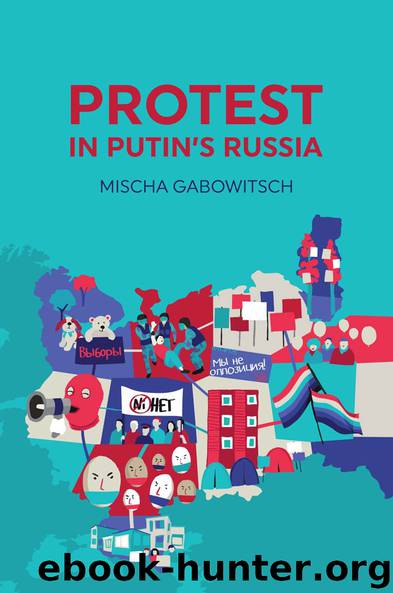Protest in Putin's Russia by Gabowitsch Mischa

Author:Gabowitsch, Mischa [Gabowitsch, Mischa]
Language: eng
Format: epub, azw3
ISBN: 9780745696287
Publisher: Wiley
Published: 2016-12-26T21:00:00+00:00
Chapter 5
Crossed Purposes: Opposition and Grassroots Protesters in the 2011–13 Protest Wave
The protest march down Yakimanka on 6 May 2012 featured many of the witty slogans and original paraphernalia that had been so typical of the earlier protests. However, many participants had also brought straightforward messages seeking to alert their fellow protesters to particular, and often local, social or environmental problems: the lack of state support for people suffering health problems after participating in the clean-up of the Chernobyl nuclear site, say, or housing rights in the Moscow region. Some of these activists attracted considerable attention and were interviewed for online media. Others, especially those with very specific grievances, went largely unnoticed.1
Among the participants I interviewed while slowly walking towards Bolotnaya Square was a group of three men in their late 20s who were carrying self-made signs saying ‘Putin, don’t destroy our homeland’ and ‘Against nickel mining in Voronezh’.
It turned out the three were not from Voronezh, a one-million-strong industrial centre about 500 km south of Moscow, but from the village of Yelan-Koleno, population just over 5,000, located a further 3.5 hours east of the regional capital. One of the three had finished his studies and moved to an industrial suburb southeast of Moscow to start a small furniture business; the others had gotten off the train that morning. They had come to protest against plans for nickel mining in their region. The presence of large nickel deposits had been known for decades, but now two large conglomerates – Norilsk Nickel and the Ural Mining and Metallurgical Company – had plans to develop it. The results of a tender were going to be announced two weeks after the March of Millions, and it was clear that a company affiliated with the two corporations would win. Hundreds of people who had formerly worked in the nickel mines outside Norilsk in northern Siberia had recently relocated to the area, and some of them had warned local residents of the devastating environmental damage wrought by nickel mining: the Norilsk area is regularly listed as one of the most polluted places on the planet. The residents were now afraid of the effects on their local environment and beyond. The river that runs through the village flows into the Khoper, itself the largest tributary to the mighty Don. There is a nature reserve nearby, and the surrounding lands, part of the famously fertile Black Earth country, are in intense agricultural use. They are used to grow beet for one of Russia’s biggest sugar refineries, located near Yelan-Koleno, and subsistence farming was an important source of sustenance after many Soviet-era factories and collective farms closed in the early 1990s.
Nobody asked the residents what they thought of the mining plans. A local protest movement began to emerge, centred in the towns of Borisoglebsk (population 63,000) and Novokhopersk (6,600) on the banks of the Khoper river and involving residents of the neighbouring Volgograd and Tambov regions (Turovets 2015). Voronezh’s regional governor, who had served as Russia’s minister of
Download
Protest in Putin's Russia by Gabowitsch Mischa.azw3
This site does not store any files on its server. We only index and link to content provided by other sites. Please contact the content providers to delete copyright contents if any and email us, we'll remove relevant links or contents immediately.
| Anthropology | Archaeology |
| Philosophy | Politics & Government |
| Social Sciences | Sociology |
| Women's Studies |
The Secret History by Donna Tartt(19058)
The Social Justice Warrior Handbook by Lisa De Pasquale(12187)
Thirteen Reasons Why by Jay Asher(8894)
This Is How You Lose Her by Junot Diaz(6877)
Weapons of Math Destruction by Cathy O'Neil(6267)
Zero to One by Peter Thiel(5789)
Beartown by Fredrik Backman(5737)
The Myth of the Strong Leader by Archie Brown(5500)
The Fire Next Time by James Baldwin(5432)
How Democracies Die by Steven Levitsky & Daniel Ziblatt(5216)
Promise Me, Dad by Joe Biden(5144)
Stone's Rules by Roger Stone(5081)
A Higher Loyalty: Truth, Lies, and Leadership by James Comey(4954)
100 Deadly Skills by Clint Emerson(4921)
Rise and Kill First by Ronen Bergman(4780)
Secrecy World by Jake Bernstein(4743)
The David Icke Guide to the Global Conspiracy (and how to end it) by David Icke(4709)
The Farm by Tom Rob Smith(4502)
The Doomsday Machine by Daniel Ellsberg(4485)
